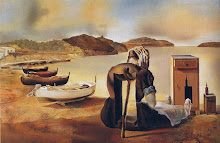Jesus Calls Levi and Eats With Sinners (Gospel of Mark)
13Once again Jesus went out beside the lake. A large crowd
came to him, and he began to teach them. 14As he walked along, he saw Levi son of Alphaeus sitting
at the tax collector’s booth. “Follow me,” Jesus told him, and Levi got up and followed him.
15While Jesus was having dinner at Levi’s house, many tax
collectors and sinners were eating with him and his disciples, for there were
many who followed him. 16When the teachers of the law who were Pharisees saw him
eating with the sinners and tax collectors, they asked his disciples: “Why does
he eat with tax collectors and sinners?”
17On hearing this, Jesus said to them, “It is not the healthy who need a doctor, but the sick. I
have not come to call the righteous, but sinners.”
This passage is used time and time again to show Christians
that we have to be careful about becoming prejudiced against those we see as
"less than." That isn't a bad
thing; clearly, Jesus meant to teach the uncomfortable righteous that he Savior
had come for the least of these. I wonder how many miss the clues in the very next passage about why the
Pharisees were predisposed in that way.
18Now John’s disciples and the Pharisees were fasting. Some
people came and asked Jesus, “How is it that John’s disciples and the disciples
of the Pharisees are fasting, but yours are not?”
19Jesus answered, “How can the guests of the bridegroom fast
while he is with them? They cannot, so long as they have him with them. 20But the time will come when the bridegroom
will be taken from them, and on that day they will fast.
Most will focus on Jesus' teaching that His disciples should
be in a spirit of celebration while the Son of God was with them; but, let's
focus our attention, for a bit, on the passage immediately before Jesus'
response. The Pharisees who grumbled about Jesus having a meal with sinners
were fasting, along with John the Baptist's disciples, in an act of piety. This means a couple of things: 1) they were
hungry when this happened...and we know how much more patient that makes
people, and, 2) the entire community of religious people were fasting together
while Jesus and His disciples were having a feast with tax collectors.
Let's back up for a minute; while many people know Pharisees
as teachers of the law and the role they played in attacking Jesus' ministry,
few know the background of the Pharisee movement. The movement started after the Greeks conquered the Jewish Kingdom set up
by the Maccabees (the ancestors of Herod). Alexander the Great not only brought
Greek rule to the Holy Land, he also brought Greek culture. While Jews were not forced to abandon their
religious tradition, quickly the Greek "Hellenism" permeated the
culture. Soon, as had been the case with many other foreign rulers in Israel,
the culture started affecting the practice of Judaism. In fact the most popular
translation of what we know as the Old Testament becomes a Greek translation
(what would later be called the Septuagint) of the original Hebrew.
Let's keep in mind what we know from the Old Testament; the
Bible is very clear that the influence of foreign nations on Israel is always
bad, and almost always leads to the pain and suffering of the Hebrews. Those
who became Pharisees, devout Jews who were experts on the scripture, knew this.
The Pharisee movement originates from this desire to keep Israel Holy and separated
from the foreign ideas which have meant doom and exile. The Pharisees became
the watchdogs, making sure that the mistakes of the pre-exile (having idols,
adopting foreign gods, slipping into morality) did not take place again.
Understanding a bit of the history may allow us to understand
the Pharisees' feelings a bit more when they saw Jesus eating with tax
collectors (local people empowered by the Romans to take funds from locals in
support of a foreign government, often with a commission thrown in). This
cozying up with the agents of a foreign government was exactly why they had
formed a watch on such things hundreds of years before.
The trap, of course, is that they were so focused on stopping
a particular kind of threat that they missed the role of God in the world
around them. They were so concentrated on keeping the scripture pristine, they
missed the object of its lessons. They were so busy being pious, that they
missed the party.
There have been enough cliché comparisons of the Pharisees
to others over the years, largely making both out to be nasty and
self-righteous. I want to speak more towards people of noble concern. Many of us keep a watch out for some sort of
danger in the lives of our friends, families, churches, country, etc... Whether
or not we realize it, we have created litmus tests, so that the object of our
devotion cannot be infected by foreign items that might ruin it. This fear
creates a rigidity in us that can often lead to polarizing opinions based
mainly on fear rather that conviction.
While none of us may look as silly as a group of hungry
Pharisees scolding Christ about doing what is Holy before God, we still might
appear silly enough, or mean enough, or uncaring enough when we allow other
concerns (other than loving God and each other with our full hearts) to become
our idol. The Pharisees, on the whole, were not bad people...they were good
people who allowed themselves to become overly concerned about the wrong thing.
Good people being concerned about the wrong things can travel some very dark
paths...just as much today as thousands of years ago.


No comments:
Post a Comment